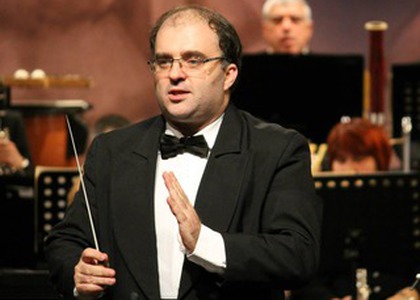> [Archived] Interviews

Interview with conductor Nayden Todorov
Guided by conductor NaydenTodorov, The National Radio Orchestra shall perform famous pieces by Johannes Brahms: Concerto No. 1 Op. 15 in D minor for piano and orchestra, with Horia Mihail as soloist and Symphony No. 1 Op. 68 in C minor.
First of all, how have the rehearsals faired so far?
As usual, I love this orchestra,they play wonderfuleven from the first rehearsal and it has a very nice sound - that is what defines an orchestra. They react to everything I tell them, which is highly appreciated as I occasionally have some unconventional ideas. Sometimes I expect an orchestra to do the opposite of what I tell them, but not in this case - they follow me and perform wonderfully. As I was saying, an orchestra is usually defined by its sounds. Especially in the past, if we look back - I'm referring to the mid 20th century - it was possible to recognise an orchestra by its sound. Nowadays, it's not so easy - as a result of globalization, most orchestras have a similar range of sounds. But, this orchestra has its typicalsounds that are very beautiful and very warm andI love it.
How do you think this problem could be solved?
It's a problem that depends on the level of the musicians. The more skilled the musicians, the less need for rehearsals as the musicians are better. However when the orchestra holds less rehearsals, the sound becomes more generic and as a result you can't tell what orchestra it is. So perhaps the problem is - it sounds crazy I know - the problem is that, in the past, musicians weren'tso good!
Today, they catch on really quick and do what they need to do, but as a result, the orchestra holds less rehearsals, so there's less time to develop this sound. Still, sometimes, the orchestra has a defined sound already and just has to maintain it. Which is very important, it should be kept in this case as well, as it is remarkable to come here and be able to recognise an orchestra by the sound.
What can you tell us about tonight's schedule?
Well, we have a wonderful soloist. I'm very fond of Brahms' compositions. He was a very difficult composer, because everyone knows about him, and by knowing him, people forget how to listen to him. Brahms has his own, very noticeable style - romantic music, but heavily inspired by Beethoven. Brahms was quite the shut-in himself, he was not extroverted - which can be identified in his music. I really like it, as I can work with the orchestra in the following manner: our performance shifting from romantic to classic and back to romantic. Brahms was a pianist so his writings were rather difficult for the orchestra. There are certain parts in the Concertos and Symphonies where the conductor knows there will be some issues. Sometimes I tell them: "At measure 55 we will have some intonation problems" or "at measure 73 we won't be together". If I go to a new orchestra -I'm not new here, but it applies to any orchestra - I already know where there will be issues, this is Brahms' music. However, this music is extraordinary, especially in these trying times, we need it because it gives us some peace and we need peace for our souls.
Translated by Jin-Cristian Yang,
University of Bucharest, Faculty of Foreign Languages and Literatures, MTTLC, year II
Corrected by Silvia Petrescu














